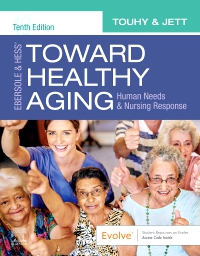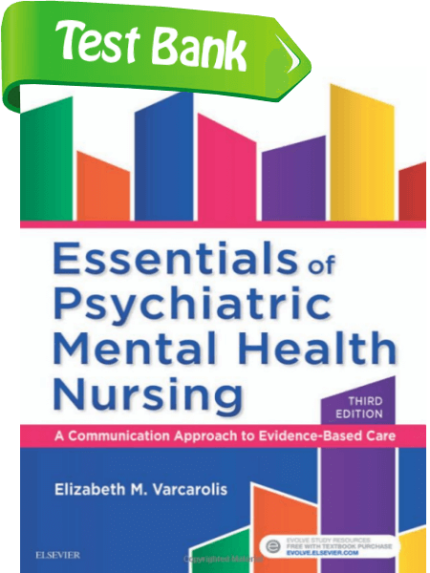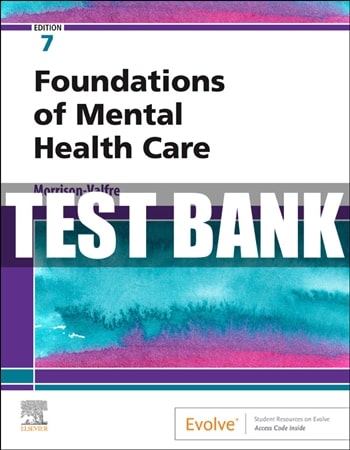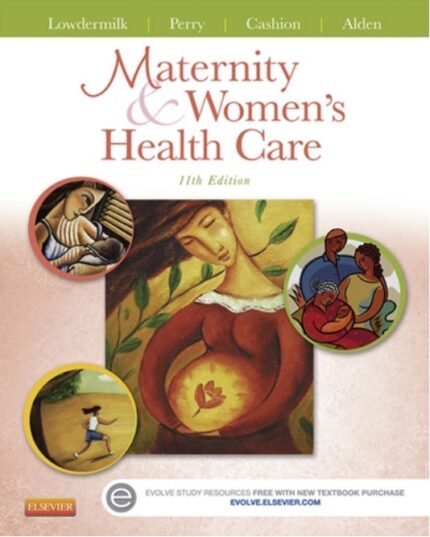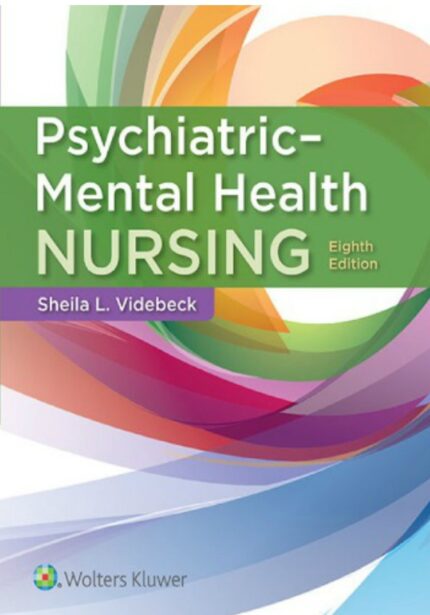Test Bank For Foundations Of Mental Health Care 4th Edition By Morrison-Valfre
Chapter 1: The History of Mental Health Care
MULTIPLE CHOICE
- The belief of the ancient Greek philosopher Plato that the rational soul controlled the irrational soul could be compared with the belief of the more recent psychological theorist:
| a. | Freud |
| b. | Pinel |
| c. | Fisher |
| d. | Rush |
ANS: A
Sigmund Freud believed that mental illness was, in part, caused by forces both within and outside the personality. Philippe Pinel advocated acceptance of mentally ill individuals as human beings in need of medical assistance. Alice Fisher was a Florence Nightingale nurse who cared for the mentally ill, and Dr. Benjamin Rush was the author of the book, Diseases of the Mind.
DIF: Cognitive Level: Comprehension REF: Page 5 | Page 6
OBJ: 2 TOP: Early Years of Mental Health
KEY: Nursing Process Step: Assessment MSC: Client Needs: Psychosocial Integrity
- If a person’s behaviors interfere with daily activities, impair her judgment, or alter her perception of reality, this person is considered to be:
| a. | Confused |
| b. | Disoriented |
| c. | Mentally healthy |
| d. | Mentally ill |
ANS: D
Mentally ill individuals cannot perform activities of daily living easily, nor do they have good judgment or perceive things realistically. Confused and disoriented people differ from mentally ill people in that they typically are not oriented to who they are, where they are, or the general time frame. Mentally healthy individuals are able to perform activities of daily living, to problem solve, and to adapt to change, and they are in touch with reality.
DIF: Cognitive Level: Comprehension REF: Page 1 OBJ: 1
TOP: Mental Illness KEY: Nursing Process Step: Assessment
MSC: Client Needs: Psychosocial Integrity
- During the mid-1500s, behaviors associated with mental illness were more accurately recorded by professionals. This practice led to ______________ for different abnormal behaviors.
| a. | Classifications |
| b. | Diagnosing |
| c. | Treatment |
| d. | Education |
ANS: A
Classification of abnormal behaviors did not begin until this time, after the practice of more accurate recording of behaviors was begun. Diagnoses, treatment guidelines, and any education regarding mental health disorders were not available during this period.
DIF: Cognitive Level: Knowledge REF: Page 3 OBJ: 3
TOP: Mental Illness During the Renaissance
KEY: Nursing Process Step: Assessment MSC: Client Needs: Psychosocial Integrity
- During the latter part of the eighteenth century, psychiatry became a separate branch of medicine, and inhumane treatment was greatly diminished by the French hospital director:
| a. | Dix |
| b. | Beers |
| c. | Pinel |
| d. | Carter |
ANS: C
Philippe Pinel advocated acceptance of the mentally ill, as well as proper treatment. Dorothea Dix crusaded for construction of mental health hospitals. Clifford Beers wrote the book, A Mind That Found Itself. President Jimmy Carter established the President’s Commission on Mental Health in 1978.
DIF: Cognitive Level: Knowledge REF: Page 4 OBJ: 4
TOP: Mental Illness in the Eighteenth Century
KEY: Nursing Process Step: Assessment MSC: Client Needs: Psychosocial Integrity
- In 1841, _______________ surveyed asylums, jails, and almshouses throughout the United States, Canada, and Scotland and is credited with bringing about public awareness and reform for the care of the mentally ill.
| a. | Sigmund Freud |
| b. | John Cade |
| c. | Florence Nightingale |
| d. | Dorothea Dix |
ANS: D
Dorothea Dix spent 20 years surveying facilities that housed mentally ill individuals and is credited with major changes in the care of the mentally ill. Sigmund Freud introduced the concept of psychoanalysis, John Cade discovered lithium carbonate for the treatment of bipolar disorder, and Florence Nightingale trained nurses in England in the 1800s.




